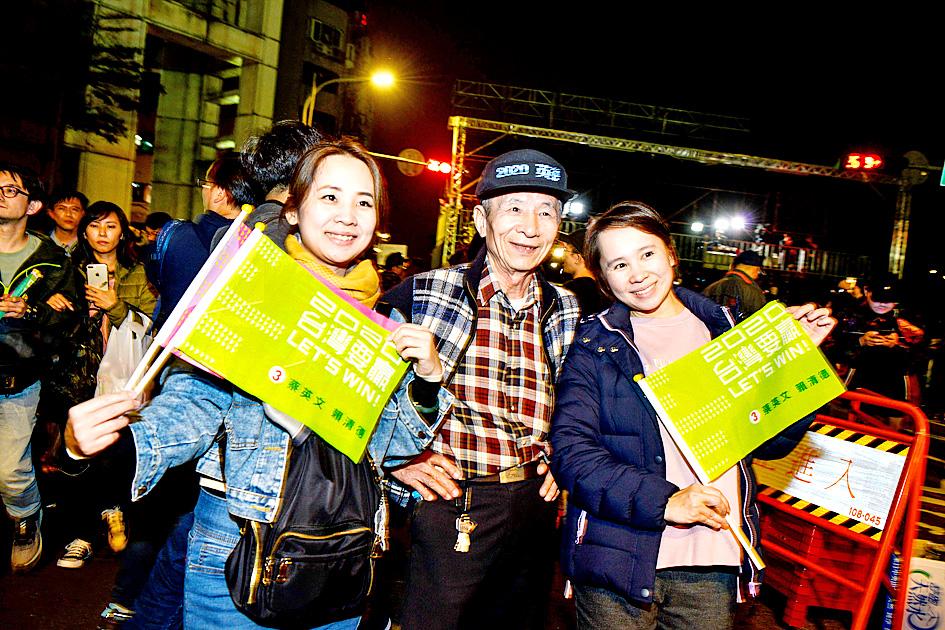About two-thirds of Taiwanese do not identify as Chinese, a survey released on Tuesday showed.
The US-based Pew Research Center found that 66 percent view themselves as Taiwanese, 28 percent as both Taiwanese and Chinese ,and 4 percent as just Chinese.
The telephone poll of 1,562 people, conducted last year, has a margin of error of 3.2 percentage points.

Photo: AFP
The results are consistent with other polls showing that people in Taiwan increasingly identify only as Taiwanese, Pew said.
Younger generations in particular have developed a distinct identity, with 83 percent of respondents younger than 30 saying that they do not consider themselves Chinese, the survey showed.
Alexander Huang (黃介正), an associate professor in Tamkang University’s Department of Diplomacy and International Relations, said that it is a question of politics, not ethnic background.
Younger Taiwanese grew up in a democracy, while China is a one-party state, he said.
Another factor, is the diplomatic pressure that China puts on Taiwan and the military exercises it conducts in Taiwan’s vicinity, Huang said.
“We are ethnic Chinese for sure, but politically, I think that’s the big difference,” he said. “It is quite understandable that people don’t want to be identified as Chinese.”
In addition, about 2.3 percent of Taiwanese are members of indigenous groups not ethnically Chinese.
The Pew survey found that about 60 percent of Taiwanese have an unfavorable view of China. While 52 percent support closer economic ties with China, only 36 percent favor closer political ties.
Conversely, more than two-thirds have a favorable view of the US, with 79 percent supporting closer political ties.

CHAOS: Iranians took to the streets playing celebratory music after reports of Khamenei’s death on Saturday, while mourners also gathered in Tehran yesterday Iranian Supreme Leader Ayatollah Ali Khamenei was killed in a major attack on Iran launched by Israel and the US, throwing the future of the Islamic republic into doubt and raising the risk of regional instability. Iranian state television and the state-run IRNA news agency announced the 86-year-old’s death early yesterday. US President Donald Trump said it gave Iranians their “greatest chance” to “take back” their country. The announcements came after a joint US and Israeli aerial bombardment that targeted Iranian military and governmental sites. Trump said the “heavy and pinpoint bombing” would continue through the week or as long

TRUST: The KMT said it respected the US’ timing and considerations, and hoped it would continue to honor its commitments to helping Taiwan bolster its defenses and deterrence US President Donald Trump is delaying a multibillion-dollar arms sale to Taiwan to ensure his visit to Beijing is successful, a New York Times report said. The weapons sales package has stalled in the US Department of State, the report said, citing US officials it did not identify. The White House has told agencies not to push forward ahead of Trump’s meeting with Chinese President Xi Jinping (習近平), it said. The two last month held a phone call to discuss trade and geopolitical flashpoints ahead of the summit. Xi raised the Taiwan issue and urged the US to handle arms sales to

BIG SPENDERS: Foreign investors bought the most Taiwan equities since 2005, signaling confidence that an AI boom would continue to benefit chipmakers Taiwan Semiconductor Manufacturing Co’s (TSMC, 台積電) market capitalization swelled to US$2 trillion for the first time following a 4.25 percent rally in its American depositary receipts (ADR) overnight, putting the world’s biggest contract chipmaker sixth on the list of the world’s biggest companies by market capitalization, just behind Amazon.com Inc. The site CompaniesMarketcap.com ranked TSMC ahead of Saudi Aramco and Meta Platforms Inc. The Taiwanese company’s ADRs on Tuesday surged to US$385.75 on the New York Stock Exchange, as strong demand for artificial intelligence (AI) applications led to chip supply constraints and boost revenue growth to record-breaking levels. Each TSMC ADR represents

Pro-democracy media tycoon Jimmy Lai’s (黎智英) fraud conviction and prison sentence were yesterday overturned by a Hong Kong court, in a surprise legal decision that comes soon after Lai was jailed for 20 years on a separate national security charge. Judges Jeremy Poon (潘兆初), Anthea Pang (彭寶琴) and Derek Pang (彭偉昌) said in the judgement that they allowed the appeal from Lai, and another defendant in the case, to proceed, as a lower court judge had “erred.” “The Court of Appeal gave them leave to appeal against their conviction, allowed their appeals, quashed the convictions and set aside the sentences,” the judges